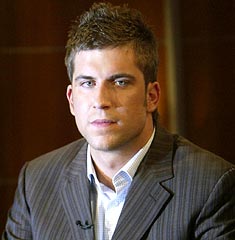 | « Back to article | Print this article |
Banned for life from refereeing and now convicted of fraud, Robert Hoyzer may yet earn an honest euro from his pivotal role in Germany's match-fixing scandal.
Hoyzer believes German fans still have an appetite for his exploits and told judges during his trial that he plans to write a book.
 The two year and five month sentence he was ordered to serve on Thursday means he will certainly have time to put pen to paper.
The two year and five month sentence he was ordered to serve on Thursday means he will certainly have time to put pen to paper.
Hoyzer shocked fans and embarrassed German soccer authorities ahead of next year's hosting of the World Cup by awarding dubious penalties, sending players off and disallowing goals in a bid to rig nine matches.
The 26-year-old has not shied away from giving his version of events, particularly during his three-day testimony in court, although not everyone has warmed to his openness -- a co-accused derided him as "the big actor" last month.
The former referee told judges he had felt targeted by the ringleader of the two million euro ($2.34 million) fraud, Croat Ante Sapina, who received a two year and 11 month sentence.
Hoyzer explained how he had visited a bar in central Berlin owned by Sapina's brother Milan and related how Ante had held up a betting slip that had won 47,000 euros.
Hoyzer said the "utopian" sum had served as bait. Presiding judge Gerti Kramer, delivering Thursday's verdict, said she and her colleagues had not believed Hoyzer's slant.
"There was no evidence that Robert Hoyzer was specifically lured in by the Sapinas and that he was a victim of the family," she said.
REFEREE TURNED WHISTLEBLOWER
Hoyzer stands out at 1.98 metres tall and in his three-piece suit he was often the smartest in court.
His playing career petered out at local Berlin level when he was 18 and he followed in his father's footsteps as a youth league referee.
He rose rapidly through the ranks, jumping four levels to the second division by the age of 24, with referee observers giving him top marks all the way.
Hoyzer's total reward for his match-fixing was 67,000 euros plus an expensive television set. It was hardly a life-changing amount but enough to make him financially very comfortable for half a year.
"Money always played an important role for the Sapina brothers and after a certain period it did for me too," Hoyzer told the court.
Hoyzer related how he would go out with 1,000 or even 2,000 euros in his wallet for meals out. Hoyzer, or "Robby" to his friends, was known as a snappy dresser, his hair styled with gel.
In mid-January, this comfortable world came crashing down as fellow referees tipped off the German football association (DFB), which then launched an enquiry.
GROWING ALLEGATIONS
Hoyzer at first denied the growing allegations, but within days admitted they were true and eventually supplied vital testimony incriminating himself and the others involved.
Hoyzer's account of events gave ample details of the crimes, a broad description of the Sapina brothers, but only brief insight into Hoyzer himself.
He did reveal his love of money and his dream of owning a black Audi car. Prosecutors say Sapina offered to buy him one until he realised Hoyzer could not drive.
He has been described as a ladies' man and women wrote letters to newspaper editors asking how they could contact him. However, his girlfriend, a 26-year-old Berlin stewardess named Antje, ended their three-year relationship while he was in jail.
Hoyzer told a newspaper that his two weeks in custody in February had been horrible and that a prison term would be "deadly". Hoyzer perhaps felt talking would help him avoid a second visit to jail.
Legal experts certainly thought his full confession would lighten his punishment and prosecutors had sought only a suspended sentence.
However, judges decided on Thursday his crime was too severe and now Hoyzer can concentrate on his book.
